 MyDogBreeds
MyDogBreeds Grand Bleu de Gascogne is originated from France but Dalmador is originated from United States. Grand Bleu de Gascogne may grow 14 cm / 6 inches higher than Dalmador. Grand Bleu de Gascogne may weigh 10 kg / 23 pounds more than Dalmador. Both Grand Bleu de Gascogne and Dalmador has almost same life span. Both Grand Bleu de Gascogne and Dalmador has almost same litter size. Grand Bleu de Gascogne requires Low maintenance. But Dalmador requires Moderate maintenance
Grand Bleu de Gascogne is originated from France but Dalmador is originated from United States. Grand Bleu de Gascogne may grow 14 cm / 6 inches higher than Dalmador. Grand Bleu de Gascogne may weigh 10 kg / 23 pounds more than Dalmador. Both Grand Bleu de Gascogne and Dalmador has almost same life span. Both Grand Bleu de Gascogne and Dalmador has almost same litter size. Grand Bleu de Gascogne requires Low maintenance. But Dalmador requires Moderate maintenance
 The Grande Bleu de Gascogne is a dog which has descended from a line of French hounds. Originating in France, the dog is actually more common in the United States than in France.
The Grande Bleu de Gascogne is a dog which has descended from a line of French hounds. Originating in France, the dog is actually more common in the United States than in France.
They were bred to hunt, and today they continue to be used for hunting, but they double up as loyal pets too.
It is believed that they descended from dogs such as the St. Hubert Hound and the English Southern Hound. The dog itself has had an influence on the development of several scent-hound breeds.
In the United States, the Grande Bleu de Gascogne was bred in the 18th century already, displaying typical pack hound behavior.The dog isn't recognized by the AKC but he is recognized by other kennel clubs as a scenthound.
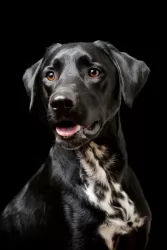 The Dalmador is a cross-breed – a mix between a Dalmation and a Labrador, and because it is a a fairly new breed you won’t find much information about the dog’s origins.
The Dalmador is a cross-breed – a mix between a Dalmation and a Labrador, and because it is a a fairly new breed you won’t find much information about the dog’s origins.
We do know that the Labrador originated in Canada and that the Dalmation comes from Croatia. Both these dog breeds have their own interesting histories. The Dalmador is a hybrid dog and isn’t a member of the American Kennel Club.
They started coming about from the 1980s when mixing one pure-breed dog with another became popular.
 The Grand Bleu de Gascogne is a large dog, standing at 65–72cm with the female usually being slightly smaller at 62–68cm. The dog weighs about 36 to 42kg.
The Grand Bleu de Gascogne is a large dog, standing at 65–72cm with the female usually being slightly smaller at 62–68cm. The dog weighs about 36 to 42kg.
He has a lean, muscular body with long legs, long ears and with a strong, noble appearance. The coat is short and smooth and the color of the coat is white and black mottled. In some instances, there'll be large patches of black over the back of the dog. The head and neck area can also be black. There are tan markings above each eye.
This is a gentle dog, not aggressive at all, and he just wants to get on with hunting. He is a social dog and loves to be around other familiar dogs and his human family. He essentially wants to live in the country where he can be busy and active with tasks to do.
If you leave him alone for too long, he becomes frustrated and resorts to baying. He can get on well with adults and children in the home, but tends to be aloof around strangers. He is an intelligent animal, and training and socialization will be important for him, especially since he is independent and likes doing things his way.
The training will make him obedient and he'll always know how to behave well around strangers.
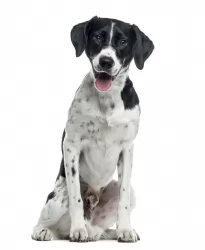 The Dalmador is a cross breed dog which comes from crossing the Labrador Retriever with a Dalmatian. The result is a muscular, well proportioned body.He has floppy ears and a long tail.
The Dalmador is a cross breed dog which comes from crossing the Labrador Retriever with a Dalmatian. The result is a muscular, well proportioned body.He has floppy ears and a long tail.
He is medium to large sized dog and can stand up to 58cm in height and weigh between 25 and 32kg. No two dogs look the same and some dogs gravitate more towards the one breed while others toward the other.
Most Dalmadors have the spotted coat, although the coat could have very visible spots or maybe just a few dots on the fur. Then again there are some Dalmadors where the coat is more of a solid color in brown or black or cream with some white patches. The double coat is short and dense and he is quite a heavy shedder.
The Dalmador is a gentle, friendly dog, making him a great family pet. You can’t really say exactly what temperament your Dalmador will have as he could inherit either the Dalmatian’s more aloof nature or he could inherit the friendly character of the Labrador.
He is quite likely to be even-tempered and is amicable with other pets in the home. He is alert too and this makes him a good watchdog. Because the Dalmador is the hybrid of two active, alert, intelligent breeds you can expect a dog which for some will be quite a handful. It is why training and socialization can be excellent for the Dalmador as it will calm him down, turning him into an obedient dog who comes and sits when told.
If you’re looking for an energetic, active and highly social dog, the Dalmador will suit an active family that can join in with all his high jinks.
 Your beautiful hunting dog is active and social and just loves to be out and about following a scent with other hunting dogs. This is what he absolutely loves to do.
Your beautiful hunting dog is active and social and just loves to be out and about following a scent with other hunting dogs. This is what he absolutely loves to do.
These days, apart from just hunting, he is also kept as a pet. He makes a good family companion because he is a non aggressive, gentle, even-tempered pet. Some of these dogs tend to be more reserved in nature. However your dog turns out, he can be your special friend when you give him all the exercise, nutrition and love that such a loyal dog deserves.
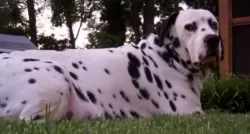 The wonderful Dalmador is such a easy-going, cheerful dog full of surprises really, as you never know which dominant traits he will inherit from either of the two dogs involved in his making.
The wonderful Dalmador is such a easy-going, cheerful dog full of surprises really, as you never know which dominant traits he will inherit from either of the two dogs involved in his making.
Friendly and social, he loves his human family and is totally loyal and loving toward them. Even tempered and faithful, if you’re looking for a wonderful 4-legged friend and companion, the Dalmador promises to make you a splendid pet.
 As a dog not known for inherited health problems, the Grande Bleu de Gascogne, with good care, can live to be 12 years of age.
As a dog not known for inherited health problems, the Grande Bleu de Gascogne, with good care, can live to be 12 years of age.
Just like with other dog breeds, there are some conditions to which this dog may also be prone, and hip dysplasia is one.
The average litter size for the Grande Bleu de Gascogne is 4 to 7 puppies. It is important to prevent your puppy growing too quickly because this is precisely what leads to musculoskeletal problems as an adult.
If you're concerned about this, speak to your vet, as you want to do your best to prevent hip problems in the future.
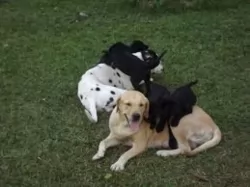 The Dalmador is a hybrid dog and they don’t experience the same health issues that the pure bred dog contends with. The Dalmador has a life expectancy of 10 to 14 years and he can reach this age if you give him all the doggy care he deserves as a 4-legged member of your family.
The Dalmador is a hybrid dog and they don’t experience the same health issues that the pure bred dog contends with. The Dalmador has a life expectancy of 10 to 14 years and he can reach this age if you give him all the doggy care he deserves as a 4-legged member of your family.
Apart from a common dog ailment – hip dysplasia, bloat and obesity are also common problems for your dog.
Bloat is a serious health condition that can actually be fatal because its a twisted stomach where trapped gas puts pressure on the diaphragm.
You will notice the swollen stomach of your pet. Larger breeds are more prone to suffer from bloat because of being deep-chested. Also known as gastric dilatation-volvulus, a vet will need to intervene with this ailment as it can be life-threatening.
 Known for his hunting skills, the Grande Bleu de Gascogne has high exercise requirements. Although a walk is wonderful for him, it won't be enough. If you have a large garden, which will be ideal for him, throw the ball so he can fetch it. If you go cycling or jogging, he'll thank you for including him in these.
Known for his hunting skills, the Grande Bleu de Gascogne has high exercise requirements. Although a walk is wonderful for him, it won't be enough. If you have a large garden, which will be ideal for him, throw the ball so he can fetch it. If you go cycling or jogging, he'll thank you for including him in these.
The Grand Bleu’s short coat is conveniently low maintenance too so you aren't going to be spending anything on professional grooming. Give him a brush twice a week to remove loose hairs and to keep his coat silky and shiny.
Their long ears should be checked regularly for a build up of wax and dirt. Dampness can also be a problem if he loves to go swimming. You can buy special ear-cleaning-for-dog products. Never probe deep in the ears as you can damage them. Rather get advice from your vet or professional groomers on how to keep the inside of his ears clean and free from infection.
An energetic hunting scentdog like this requires high quality food with some raw meat added in from time to time. He must always have access to fresh, cool water.
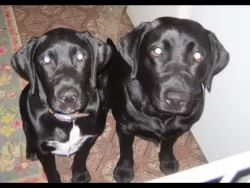 The Dalmador is a medium to large dog so you want to be feeding him one or two bowls of food a day. You want to be giving your Dalmador top-quality food to ensure good health. The lower quality foods are inclined to have ingredients in them that aren’t good for your pet.
The Dalmador is a medium to large dog so you want to be feeding him one or two bowls of food a day. You want to be giving your Dalmador top-quality food to ensure good health. The lower quality foods are inclined to have ingredients in them that aren’t good for your pet.
Always try to include some home-made food into your pet’s diet such as cooked brown rice, cooked chicken and vegetables. You can mix this into some of his dry kibble. It is important to include some raw meat into his diet from time to time as well.
Clean water must be constantly available. Without good quality food and water, you jeopardize the health of your pet.
He isn’t going to require much maintenance so a good brush twice a week will rid him of loose hairs and keep his coat shiny and glossy.
Other things to check regularly are his ears and to brush his teeth 2 or 3 times a week. Don’t neglect giving him a good amount of exercise too.